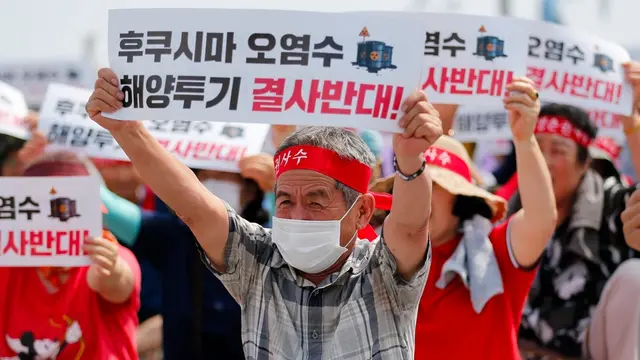The leader of South Korea's main opposition Democratic Party sent a letter to Japanese Prime Minister Fumio Kishida, urging him to suspend the planned discharge of nuclear-contaminated wastewater.
Lee Jae-myung, the Democratic Party chief, delivered the letter via the Japanese embassy in Seoul on July 28, calling for Kishida to hold off on releasing radioactive wastewater from the crippled Fukushima Daiichi nuclear power plant, the party spokesperson told a press briefing on Monday.
In the letter, Lee expressed South Korean people's concern for and opposition to the discharge plan with five proposals, such as launching a standing consultative body for environmental impact assessment, and finding safe alternatives together through cooperation with the international community.
Despite wide criticisms from both home and abroad, the Japanese government has been pushing for discharge of the radioactive wastewater this summer from the Fukushima nuclear power plant hit by a massive earthquake and an ensuing tsunami in March 2011.
Opposition of Fukushima environmentalist
An environmentalist in Japan's Fukushima Prefecture voiced his opposition to Japan's plan to dump nuclear-contaminated water from the crippled Fukushima Daiichi nuclear power plant into the sea.
Tsutomu Yoneyama, a resident of Iwaki City in Fukushima, lives less than 60 kilometers from the nuclear power plant, and he experienced the Fukushima nuclear accident in 2011.
After more than a decade of rebuilding, the local residents finally see a glimmer of hope since the tragedy, he recalled. But now the Japanese government wants to release nuclear-contaminated water into the sea, which will once again cause damage to the region and the world.
"The Fukushima nuclear accident has impacted the whole world greatly. But now, during the recovery process of the Fukushima residents, they want to affect many places again by discharging the polluted water into the sea. This will incur huge harm to residents in Fukushima Prefecture and fishermen in Miyagi Prefecture, Ibaraki Prefecture and other places, and even to the Pacific island nations," the environmentalist told China Media Group (CMG).
He pointed out that a safer solution is to keep the contaminated water stored on land, rather than release it into the sea once for all.
"Radioactive elements all have a half-life. There's no need to discharge it into the sea hastily. We are very disappointed with the decision to discharge it into the sea. But all we can do is to keep protesting."
Worries of Japan's fishermen
Japanese fishermen have also expressed growing concern over the government's plan to discharge nuclear-contaminated wastewater from the crippled Fukushima Daiichi Nuclear Power Plant into the sea.
"The ocean is our workplace, and no one has the right to pollute it," said Haruo Ono, a fisherman from Fukushima prefecture.
The 70-year-old who works at a small port in Shinchi town, north of the plant, made the remarks at the 2023 World Conference against A and H Bombs on Sunday in Fukushima city organized by citizen groups including Japan Council against Atomic and Hydrogen Bombs, or Gensuikyo.
"Once the ocean is contaminated, it would be impossible to clean it up," Ono expressed his worries, advocating for the contaminated water to be "securely stored in tanks instead."
It is unacceptable to allow further radioactive contamination into the environment, and the hasty discharge of nuclear-contaminated wastewater displays a lack of responsibility, said Yasunari Fujimoto, co-speaker at Gensuikyo, at Sunday's meeting, which saw approximately 550 participants.
Also seen at the meeting were more than 20 lawmakers from South Korea and local citizens in Fukushima city, holding banners that read such as "Japanese government must immediately stop discharging nuclear-polluted water into the sea," stressing the need to protect the ocean collectively.
Japan's Minister of Economy, Trade and Industry, Yasutoshi Nishimura, visited fisheries cooperative associations in Fukushima cities of Soma and Iwaki on Sunday to seek understanding from local fishermen of the government's plan to start the water release around this summer.
Toshimitsu Konno, head of Fukushima prefecture's Soma Futaba Fisheries Cooperative Association, said after the meeting that the government's explanations were still not able to gain the understanding of local fishermen.
Those who work in the fishing industry voiced concerns about the future as the water release will continue until the decommissioning of the nuclear plant, intimidated by the potential impact on their livelihoods once the discharge begins.
"I was shocked when people around me say that 'we won't let our children eat fish if the contaminated water is released into the ocean,'" said Koe Shoji, a local fisherman's wife.
Kiyomi Suzuki, who works in the fishing industry alongside her husband and son, expressed uncertainty about whether her son should continue in the fishing profession and doubted what the future holds for her grandchildren.
Prior to his trip to Fukushima, Nishimura visited the neighboring prefecture of Miyagi on July 29 to meet with local fishery operators.
"Our stance of opposing (the water release plan) has not changed," said Haruhiko Terasawa, head of the Miyagi prefectural fisheries cooperative association.
Some countries and regions opposing the discharge have strengthened their inspection of Japanese seafood for radioactive substances, resulting in lower prices and stalled distribution of Japanese seafood, said Terasawa.
He urged the Japanese government to "remedy the current situation as the first step" as actual damages caused could escalate further if the discharge proceeds.
Miyagi and Fukushima are two of Japan's three northeastern prefectures worst hit by the March 2011 earthquake and tsunami.
(Xinhua)
 简体中文
简体中文

